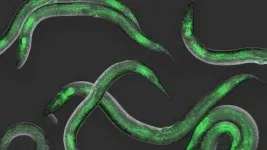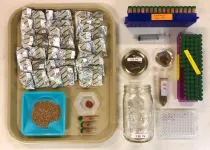(Press-News.org) Images
Researchers at Michigan State University have shown that table salt outperforms other expensive catalysts being explored for the chemical recycling of polyolefin polymers, which account for 60% of plastic waste.
The research, published in the journal Advanced Sustainable Systems, shows that sodium chloride could provide a safe, inexpensive and reusable way to make plastics more recyclable.
The team also showed that table salt and other catalysts could be used in the recycling of metallized plastic films — like those used in potato chip bags — which are currently not recyclable.
EAST LANSING, Mich. – Muhammad Rabnawaz, an associate professor in Michigan State University’s top-ranked School of Packaging and recent inductee into the National Academy of Inventors, has always believed that the most brilliant solution is also the simplest.
That belief is reflected in his team’s new publication in the journal Advanced Sustainable Systems.
Rabnawaz and his colleagues showed that sodium chloride — table salt — can outperform much more expensive materials being explored to help recycle plastics.
“This is really exciting,” Rabnawaz said. “We need simple, low-cost solutions to take on a big problem like plastics recycling.”
Although plastics have historically been marketed as recyclable, the reality is that nearly 90% of plastic waste in the United States ends up in landfills, in incinerators or as pollution in the environment.
One of the reasons plastics have become so disposable is that the materials recovered from recycling aren’t valuable enough to spend the money and resources required to get them.
According to the team’s projections, table salt could flip the economics and drastically reduce costs when it comes to a recycling process known as pyrolysis, which works through a combination of heat and chemistry.
Although Rabnawaz expected salt to have an impact because of how well it conducts heat, he was still surprised by how well it worked. It outperformed expensive catalysts — chemicals designed to spur reactions along — and he believes his team has just started tapping into its potential.
Furthermore, the work is already getting attention from big names in industry, he said.
In fact, the research was partially supported by Conagra Brands, a consumer packaged goods company. The U.S. Department of Agriculture and MSU AgBioResearch also helped finance the work.
A catalyst worth its salt
Pyrolysis is a process that breaks down the plastics into a mixture of simpler, carbon-based compounds, which come out in three forms: gas, liquid oil and solid wax.
That wax component is often undesirable, Rabnawaz said, yet it can account for more than half of products, by weight, of current pyrolysis methods. That’s even when using catalysts, which are helpful, but they often can be toxic or prohibitively expensive to be applied in managing waste plastics.
Platinum, for example, has very attractive catalytic properties, which is why it’s used in catalytic converters to reduce harmful emissions from cars. But it’s also very pricey, which is why thieves steal catalytic converters.
Although bandits are unlikely to rob platinum-based materials from a sweltering pyrolysis reactor, attempting to recycle plastics with those catalysts would still require a hefty investment — millions, if not hundreds of millions, of dollars, Rabnawaz said. And current catalysts aren’t efficient enough to justify that cost.
“No company in the world has that kind of cash to burn,” Rabnawaz said.
In earlier work, Rabnawaz and his team showed that copper oxide and table salt worked as catalysts to break down a plastic known as polystyrene. Now, they’ve shown table salt alone can eliminate the wax byproduct in the pyrolysis of polyolefins — polymers that account for 60% of plastic waste.
“That first paper was important, but I didn’t get excited until we worked with polyolefins,” Rabnawaz said. “Polyolefins are huge, and we just outperformed expensive catalysts.”
Joining Rabnawaz on this project were Christopher Saffron, an associate professor in the College of Agriculture and Natural Resources, visiting scholar Mohamed Shaker and MSU doctoral student Vikash Kumar.
When using table salt as a catalyst to pyrolyze polyolefins, the team produced mostly liquid oil containing hydrocarbon molecules similar to what’s found in diesel fuel, Rabnawaz said. Another perk of the salt catalyst, the researchers showed, is it can be reused.
“You can recover salt by simply washing the obtained oil with water,” Rabnawaz said.
The researchers also showed that table salt aided in the pyrolysis of metallized plastic films, which are commonly used in food packaging, like potato chip bags, which isn’t currently recycled.
Although pure table salt didn’t outperform a platinum-alumina catalyst the team also tested with metallized films, the results were similar, and the salt is a fraction of the cost.
Rabnawaz, however, stressed that metallized films, while useful, are inherently problematic. He envisions a world where such films are no longer needed, which is why his team is also working to replace them with more sustainable materials.
The team will also continue working to further its pyrolysis project.
For instance, the team has yet to fully characterize the gas products of pyrolysis with table salt. And Rabnawaz believes the team can improve this approach so that the liquid products contain chemicals with more valuable applications than being burned as fuel.
Still, the early returns of the team’s new table salt tactics are encouraging. Based on a quick, preliminary economic analysis, the team estimated a commercial pyrolysis reactor could triple its profits just by adding salt.
By Matt Davenport
Read on MSUToday.
###
Michigan State University has been advancing the common good with uncommon will for more than 165 years. One of the world's leading research universities, MSU pushes the boundaries of discovery to make a better, safer, healthier world for all while providing life-changing opportunities to a diverse and inclusive academic community through more than 400 programs of study in 17 degree-granting colleges.
For MSU news on the Web, go to MSUToday. Follow MSU News on Twitter at twitter.com/MSUnews.
END
MSU research shows table salt could be the secret ingredient for better chemical recycling
2023-09-08
ELSE PRESS RELEASES FROM THIS DATE:
RESEARCH ALERT: City of Hope scientists identify new therapeutic target for metastatic cancer
2023-09-08
FINDINGS
In a recent study led by Lei Jiang, Ph.D., an assistant professor of molecular and cellular endocrinology, a team of researchers from City of Hope and the University of Texas Southwestern Medical Center, found a potential new target for treating patients with metastatic cancer. Their findings were published in the August 29 issue of the journal Cell Reports.
The goal of the team’s study was to elucidate the role of reductive carboxylation in redox metabolism, a process believed to be important for metastatic cancer. Reductive carboxylation is best known as a metabolic pathway that provides a molecule called acetyl-CoA so that it can be turned into lipids, which ...
McWilliams School of Biomedical Informatics researchers awarded $3.4M NIH grant to understand link between chronic health conditions and Alzheimer's disease
2023-09-08
A three-year, $3.4 million grant to investigate how Alzheimer’s disease is connected to multiple chronic diseases has been awarded to UTHealth Houston researchers by the National Institute on Aging, part of the National Institutes of Health.
To study this, a team led by Xiaoqian Jiang, PhD, principal investigator and professor and chair in the Department of Health Data Science and Artificial Intelligence with McWilliams School of Biomedical Informatics at UTHealth Houston, will build risk trajectory maps for patients using clinical data and electronic health records. Specifically, they will develop electronic health records ...
SwiftPharma and the Population Council pursue agreement to manufacture Griffithsin needed for the development of a fast-dissolving insert for protection against HIV
2023-09-08
September 8, 2023 – SwiftPharma, a Belgium-based manufacturer, and the Population Council, a global nonprofit research organization, have signed a Manufacturing Master Service Agreement for the plant-based manufacture of Griffithsin to further the Council’s development of a Griffithsin fast-dissolving vaginal insert for protection against HIV.
The Population Council has been developing a non-antiretroviral HIV-prevention method containing Griffithsin (GRFT) in a fast-dissolving insert (FDI). This Griffithsin FDI is an on-demand, user-controlled, portable prevention technology in early development ...
What defines a safety-net hospital?
2023-09-08
Safety-net hospitals have a common mission to provide care for Medicaid beneficiaries and those who are uninsured, but there’s no universal definition for these hospitals—complicating efforts to allocate funding.
In a new analysis published in JAMA Network Open and led by researchers at the NYU School of Global Public Health, the research team looked at five established definitions for safety-net hospitals and found that different criteria captured varying hospitals and characteristics. As a result, when the Centers for Medicaid and Medicare Services (CMS) use one definition ...
Heatwaves hitting Antarctica too
2023-09-08
The world saw another year full of extreme weather events resulting from climate change in 2022, from intense storms to soaring temperatures and rising sea levels. Antarctica was no exception, according to new research published this week.
In the 33rd annual State of the Climate report, an international assessment of the global climate published Sept. 6 in the Bulletin of the American Meteorological Society, CU Boulder researchers report that the planet’s coldest and driest continent experienced both an unprecedented heatwave and extreme precipitation last year.
“My hope is that the public starts to see both the fragility and complexity of these ...
These worms have rhythm
2023-09-08
There’s a rhythm to developing life. Growing from a tiny cell cluster into an adult organism takes precise timing and control. The right genes must turn on at the right time, for the right duration, and in the correct order. Losing the rhythm can lead to diseases like cancer. So, what keeps every gene on beat?
Cold Spring Harbor Laboratory (CSHL) Professor Christopher Hammell has found that in the worm C. elegans, this genetic orchestra has no single conductor. Instead, a quartet of molecules works in concert to time each developmental stage. Hammell says this process shares some similarities with the circadian clocks that control human ...
Sleep-wake therapy gives new hope for teens with depression
2023-09-08
Sleep-Wake Therapy Gives New Hope for Teens with Depression
Promoting healthy sleep in teen night owls brings adolescents’ biology and school demands in alignment.
School systems aren’t built for kids who fall asleep and wake up late, the so-called “night owls,” which may help explain why this group of teens is more prone to depression.
Now, researchers at UC San Francisco have found a way to help these kids adjust to their natural sleep-cycle rhythms while still fulfilling their school responsibilities. The findings are a welcome sign for adolescents with ...
Study explores an underappreciated way warmer temperatures will impact ecosystems: Decomposition
2023-09-08
Our world is changing, and warming temperatures will alter our natural ecosystems. Some of these changes will be straightforward, like animal ranges creeping northward as they strive to maintain their ideal temperatures. But other changes will be more complicated, as warming sets off complex chain reactions that reverberate through these systems.
An important process in ecosystems is the decomposition of plant litter, in which dead plant material is broken down by animals, fungi, and microbes, making its nutrients accessible to the next generation of plants. How quickly this breakdown happens — the decomposition ...
UMBC team of data scientists named a tools competition winner
2023-09-08
Baltimore – A team of four data scientists from the University of Maryland, Baltimore County, was named today as one of 32 winners of the Tools Competition, one of the largest education technology (edtech) competitions in the world that awarded more than $4 million to winners this year.
The team was a winner in the DARPA AI Tools for Adult Learning opportunity, which sought artificial intelligence-powered tools to help adults learn complex topics necessary for the current and future national security workforce (e.g., AI engineering ...
Synchrotron studies change the composition of the Earth’s core
2023-09-08
In work published in Science Advances, a team of researchers have determined a new pressure scale, which is critical for understanding the Earth’s composition. Using x-rays from a uniquely powerful spectrometer at RIKEN’s SPring-8 Center they avoided some of the large approximations of previous work, discovering that the previous scale overestimated pressure by more than 20% at 230 gigapascals (2.3 million atmospheres) - a pressure reached in Earth’s core. This is similar to someone running a marathon that they thought was 42 kilometers, but finding they had only really run 34 kilometers. While 20% might seem like a modest correction, it has big implications.
An accurate ...



